|
Limitar tu búsqueda
[+–] Compilador o editor
[+–] Creator
- Acevedo, Germán (2)
- Almeida de Menezes, Tatiane (2)
- Almeida, Célia (2)
- Amuedo Dorantes, Catalina (2)
- Campolina, Bernardo (2)
- Coello Levet, Carlo G. (2)
- Conferencia Interamericana de Seguridad Social (1)
- Cox-Edwards, Alejandra (2)
- Cruz Rivero, Carlos (2)
- Eskenazi, Patricio (2)
- Funkhouser, Edward (2)
- Gaiger Silveira, Fernando (2)
- Hu, Chiung-Yin (2)
- Hysenbegasi, Alketa (2)
- Lucas, Robert E.B. (2)
- Luna Ruiz, Gabriela A. (2)
- Marques, Rosa Maria (2)
- Martin, Philip (2)
- Medici, André Cezar (4)
- Mendes Santos Servo, Luciana (2)
- Mendes, Áquilas (2)
- Morales Barrera, Raquel (2)
- Pagés, Carmen (2)
- Piola, Sérgio Francisco (2)
- Pozo, Susan (4)
- Sana, Mariano (2)
- Valero Gil, Jorge (2)
- Weaver Barros, Bernardo (2)
[+–] Editorial
[+–] Fecha
[+–] Formato
[+–] Idioma
[+–] Tipo de documento
[+–] Tipo de recurso
|

|
|
Is international migration a substitute for social security
The focus on short-term macroeconomic factors, including unemployment and wages, is insufficient to explain international migration. Institutional factors, bound to change only in the long run, can potentially have a large impact on migration flows. To illustrate this, we analyze Mexico-U.S. migration focusing on social security coverage, an important indicator of job formality. Using...
|
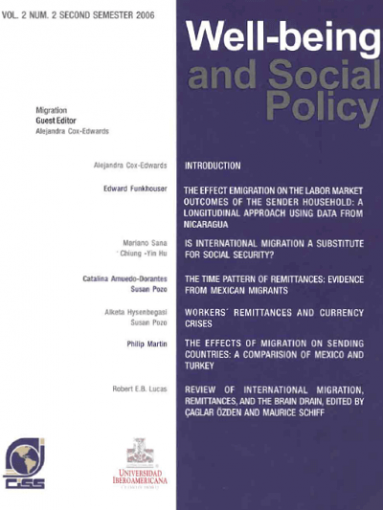
|
|
|
|

|
|
The effect of migration on the labor market outcomes of the sender household: a longitudinal approach using data from Nicaragua
In this paper, I use longitudinal data from the 1998 and 2001 Living Standard Measurement Surveys in Nicaragua to examine the impact of the emigration of household members on the household labor market integration and poverty. The main findings of the paper are that households from which an emigrant left had a reduction in members, a reduction in working members, a reduction in labor income than...
|
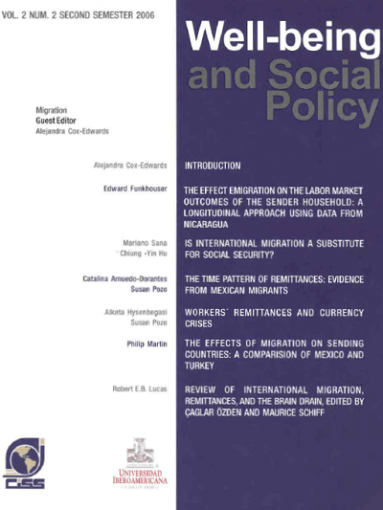
|
|
|
|

|
|
Incomplete health reforms in Latin America: some findings on their political economy
This paper raises the point that only few health reforms implemented in Latin American countries modified the existing health systems in order to fix the problems brought by the institutional fragmentation typical of this sector. A great part of these reforms did not implemented the necessary measures to improve coordination among health systems in the prevailing pluralistic model and besides,...
|
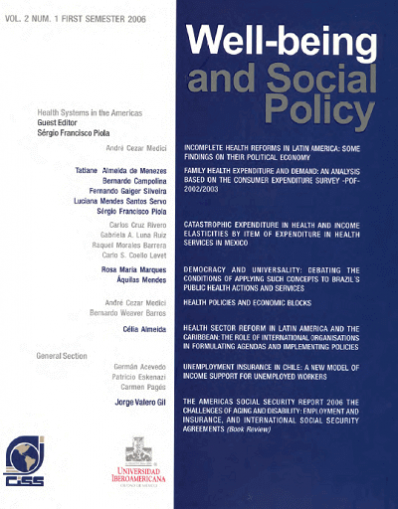
|
|
|
|

|
|
The Americas Social Security Report 2006 The challenges of aging and disability: employment and insurance, and international social security agreements (book review)
The 2006 Issue of the Report on Social Security in the Americas is divided in four chapters. The first two chapters address older-adult issues, the third chapter deals with disability-related problems, and the fourth chapter discusses Social Security agreements in the Americas. In the Presentation, it was pointed out that the objective of the Report on Social Security in the Americas is to become...
|
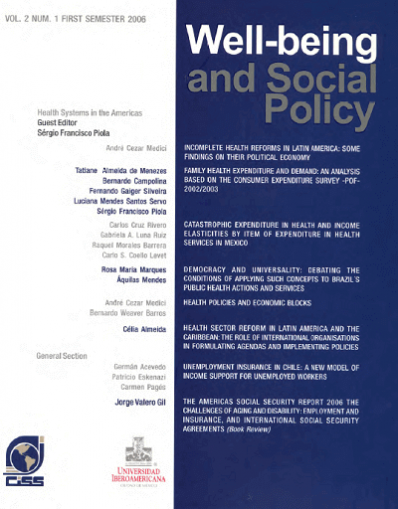
|
|
|
|

|
|
Unemployment insurance in Chile: a new model of income support for unemployed workers
This paper describes the Chilean experience concerning the implementation of a new unemployment insurance (UI) program. The use of individual savings accounts and private management are essential elements. In addition, a redistributive fund (Common Fund) helps workers pool risks, distributing resources from employed to unemployed workers and from stable firms to workers with low incomes and...
|
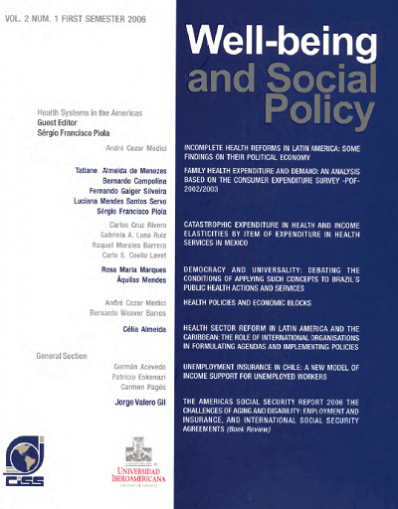
|
|
|
|

|
|
Health sector reform in Latin America and the Caribbean: the role of international organisations in formulating agendas and implementing policies
This article examines health sector reforms in Latin America and the Caribbean to discuss the ideological, theoretical, and conceptual elements that inform the reform agenda and the models put forward for attaining greater equity in the region’s countries. Its starting assumption is that the relevant literature generally neglects the economic, social, and political aspects underlying the...
|
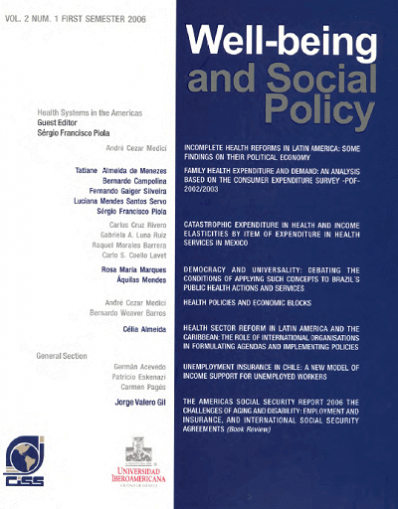
|
|
|
|

|
|
Health policies and economic blocks
This paper analyzes the roles of health goods and services markets within the regional integration process. It is a known fact that the consolidation of integrated markets is slower regarding social goods and services (as health and education) than among other goods and services (e.g. durable consumption goods). The paper discusses the nature of the health sector and its global dimension, showing...
|
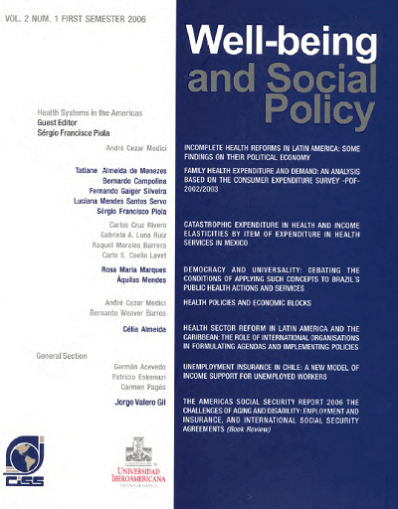
|
|
|
|

|
|
Democracy and universality: debating the conditions of applying such concepts to Brazil's public health actions and services
This paper reviews the determinants and conditionalities of the process of universalizing public health in developed countries, notably the European ones, and in Brazil, and is aimed at highlighting their differences. The first part discloses the main interpretations on the constructing of the Welfare State, emphasizing the characteristics of that historical moment and its articulation with...
|
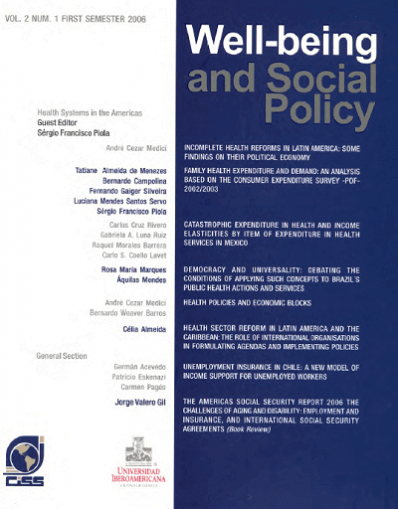
|
|
|
|

|
|
Catastrophic expenditure in health and income elasticities by item of expenditure in health services in Mexico
The objective of this article is to put in economic perspective the expenditure in health within the pattern of family expenditure of the Mexican households. Information of the National Survey on Income Expenditure of Households (ENIGH) of Mexico of 2004 is analyzed on: structure of the expenditure of the households, expenditure in health and income-expenditure elasticities in health; by...
|
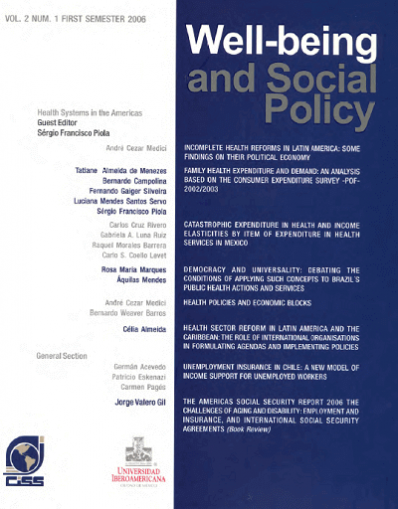
|
|
|
|

|
|
Family health expanditure and demand: an analysis based on the consumer expenditure survey - POF - 2002/2003
This paper aims at analyzing healthcare expenditure and demand of families, by estimating income-elasticity and price-elasticity for ten groups of products using the so-called model Linear Almost Ideal Demand System (LAIDS). The 2002/03 consumer expenditure surveys (POF) of the Fundação Instituto Brasileiro de Geografia e Estatística – FIBGE (Brazilian census bureau) are used, providing extremely...
|
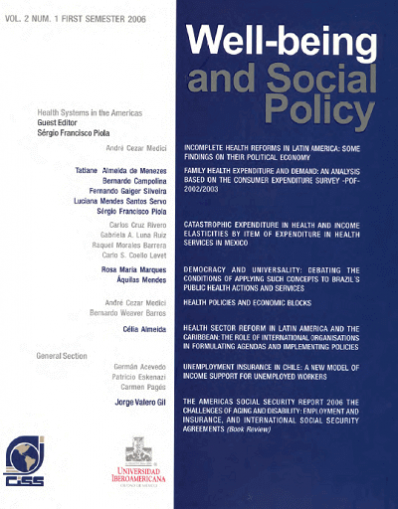
|
|
|
|

|
|
Informe sobre la seguridad social en América 2007: Globalización y protección social
Las temáticas para la elaboración de este Informe fueron aprobados por el Comité Permanente Inter-Americano de Seguridad Social durante su Asamblea General XXI en Mar del Plata, Argentina: Globalización y Seguridad Social. Parte del material es descriptivo y tiene por objetivo colocar los temas en perspectiva y ponderar su importancia. En esta categoría deben incluirse las clasificaciones de...
|

|
|
|
|
|